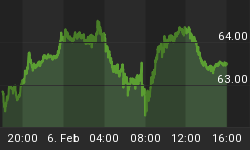Below is an extract from a commentary originally posted at www.speculative-investor.com on 13th March, 2008.
The term "stagflation" was invented -- and became very popular -- during the 1970s to describe the situation where persistently weak economic growth goes hand-in-hand with a strong upward trend in the general level of consumer prices, as if such a situation represented a strange set of circumstances that warranted its own name. The term has again become popular, but the whole concept of stagflation is based on a misunderstanding of the relationship between prices and economic growth.
The perceived need to have a distinct label for the supposedly strange coupling of rising prices and falling growth stems from the erroneous belief that strong economic growth causes prices to rise and weak economic growth causes them to fall. The reality is the exact opposite -- strong economic growth puts DOWNWARD pressure on prices because it involves an increase in the supply of goods and services. If monetary factors are constant while the supply of goods and services increases then the same amount of money will be 'chasing' a greater supply of 'stuff', and the average price of 'stuff' will fall. By the same token, if monetary factors are constant while the economy shrinks then the same amount of money will be 'chasing' a smaller supply of 'stuff', leading to HIGHER prices.
Of course, monetary factors aren't usually constant, especially under the monetary system that has been in place since 1971. What tends to happen these days is that an economic slowdown prompts the central bank and the government to implement counter-cyclical policies that lead to faster growth in the money supply. The end result is a large increase in the supply of money at a time when the supply of the things that money can buy is either falling or growing at a relatively slow rate; that is, the end result is the perfect recipe for higher prices. This is the way the law of supply and demand naturally operates. There is nothing strange about it and there was never any need to invent a new word to describe it.
"Inflationary recession" is, we think, a better term than "stagflation". In a world where money can be created in unlimited amounts and counter-cyclical monetary/fiscal policies are enormously popular, most recessions will be inflationary. In fact, the weaker the economy becomes the more inflation there will likely be and the faster consumer prices will likely rise. It is therefore not surprising that the worst recession experienced by the US over the past 40 years (1973-1975) coincided with the fastest increase in the general price level.
A related misconception revolves around the belief that the Fed is currently in a tough spot because it can't simultaneously stimulate economic growth and keep inflationary forces in check. The Fed is certainly in a tough spot, but not for this reason. As explained above, there is NO trade-off between inflationary pressures and real economic growth. The opposite is actually true -- real economic growth puts downward pressure on prices, and less currency depreciation leads to less misallocation of resources, which, in turn, paves the way for higher economic growth.
The problem facing the Fed is that it can't stimulate economic growth, period. All it can do is depreciate the value of the dollar, and the more rapidly it depreciates the dollar the slower the long-term economic growth rate will be.
Another common misconception -- one that crops up every time a recession looms on the horizon -- is that insufficient aggregate demand (insufficient consumption) lies at the root of the economic malaise. Someone who makes the mistake of thinking that insufficient aggregate demand is the problem will wrongly believe that the solution entails doing something to boost demand. And in most cases, the recommended demand-boosting 'solution' will involve currency depreciation and increased government spending/borrowing.
The truth of the matter is that "insufficient aggregate demand" can never be the underlying problem because a sustainable increase in demand must be preceded by an increase in production. To put it another way, in order for someone to consume more they must first either produce more, or dip into their stored past production (savings), or borrow the excess production of someone else. In each case, production precedes consumption.
A person can also boost his/her consumption of goods and services by borrowing money that gets created 'out of thin air' by a bank, but because the increased consumption in this case is not backed by increased production it does not contribute to sustainable economic growth. It will, instead, contribute to an increase in the general level of consumer prices, which will, in turn, have a deleterious effect on long-term economic growth.
The bottom line is that you cannot get something for nothing -- you cannot get a sustained increase in consumption without a preceding increase in production. Moreover, attempts by interventionist governments to boost consumption in response to economic weakness will lead to the worst possible scenario for consumers -- rising consumer prices at a time of rising unemployment. So, why do so many people advocate policies designed to stimulate demand/consumption whenever the economy heads into recession? Because they are either economically illiterate or willing to accept a more negative long-term outcome in exchange for a potential short-term gain.















